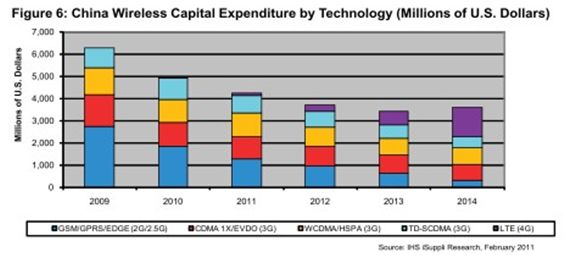According to IHS iSuppli's research, China's investment in next-generation 4G wireless technology LTE will double in 2011 as major Chinese telecom operators upgrade their services.
Although China's current capital expenditure on LTE is very small, but in the next few years, the operator's expenditure will increase rapidly. It is estimated that LTE capital expenditure will reach 100 million US dollars in 2011, which is twice that in 2010. Next year it will grow to US $ 300 million, and it will rise to US $ 600 million the following year, and will reach US $ 1.3 billion by 2014, as shown in Figure 6.

In contrast, for most of the next three years, capital expenditures on 2G and 3G wireless technologies will be on the decline. 2G and 3G technologies continue to be used in China. China has the largest population in the world and the third largest territory.
Three different 3G technologies have been put into commercial application in China, which is unique in the world. After a large-scale reorganization of China's telecommunications industry in 2008, three operators launched three 3G technologies. However, as 3G networks are now collectively upgraded to 4G, all three operators may switch to LTE.
China Mobile is the largest operator in China and the largest telecommunications operator in the world. It is expected that it will launch LTE this year. In an LTE cooperation trial, China Mobile has teamed up with Verizon and Vodafone. Equipment suppliers participating in this trial include Alcatel-Lucent, Ericsson, Motorola, Nokia Siemens Networks and Nortel Networks. This test aims to deploy more than 100 base stations in six cities, covering more than 100 million users.
China Telecom and China Unicom are two other operators in China. They will deploy LTE in 2012-2013. IHS learned that China Telecom is waiting for LTE to mature and then fully invest. China Unicom will first deploy LTE in major cities such as Shanghai and Beijing, while considering commercial deployment after 2013.
Although each operator has its own timetable, its development to the next generation of 4G technology is supported by the Chinese government. IHS believes that if it wants to have a positive early impact on the market, especially when Chinese operators conduct business in an increasingly competitive environment, equipment suppliers should occupy a favorable position so that they can take advantage of the current wireless business to shift to new standards Opportunity to come.
At present, 3G technology accounts for a large proportion of China's wireless capital expenditure. However, 3G will only account for 55% of capital expenditures by 2014, down from 67% this year. IHS iSuppli's research shows that, on the contrary, the proportion of China's wireless expenditure on LTE will rise to about 36% in three years, while the proportion of total expenditure in 2011 is actually negligible.
All auto filters are designed to prevent harmful debris from entering any parts where air and fluid flows, including your engine, radiator, fuel lines and more. Once a filter is no longer performing its intended function, decreased performance-even engine damage-can result.
When your air filter is dirty, your engine is forced to work harder, resulting in poor fuel economy, higher emissions and, possibly, a loss of engine power. In turn, as a worst-case scenario, a clogged Cabin Air Filter can lead to under-performance of the A/C system, causing weak air flow from the cabin vents. It can also lead to unwanted, unfiltered air in the cabin. As for a mucked-up fuel filter, that`ll land you with a weakened fuel supply to injectors, a reduction in engine power, poor acceleration and lousy fuel economy-not to mention a potential breakdown.
They protect vital car parts by keeping harmful debris at bay so your car runs right. Filters also ensure your car runs more efficiently. The cleaner your filter, the more it allows for the maximum flow of air or fluid through the system. Like a clogged drain, a dirty filter starves the system of the vital air or fluid and makes each system it protects work harder to do its job. Once filters are dirtied, they should be replaced.
it`s recommended that you get your filters replaced every 12 months or 12,000 miles, but check your owner`s manual for specifics about your vehicle`s filter replacement schedules.
Automotive Filter,Car Air Filter,Car Cabin Air Filter, Car Oil Filter
Donguan Bronco Filter Co., Ltd , https://www.broncofilter-cn.com